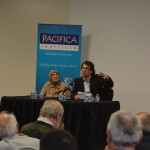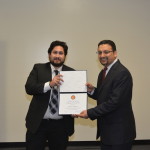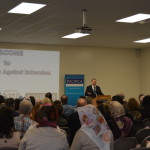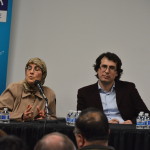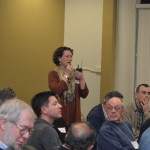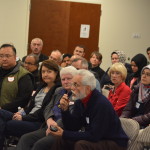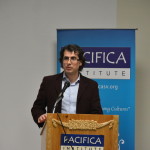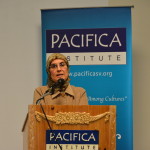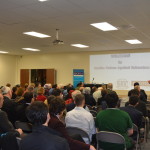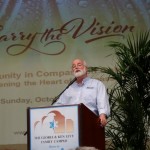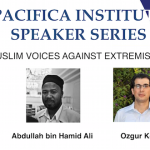 Speaking Out Against Extremism
Speaking Out Against Extremism
As co-founder and curriculum director for ING, a group which has educated students, governmental agencies, religious congregations, hospital staff and more about Islam since 1993, Ameena Jandali has been helping people understand what Islam is for a long time. To an attentive audience gathered at the Pacifica Institute in Sunnyvale earlier this week, she was concerned that after all these years, there still is a need to explain how Islam is a religion of peace.
ING was founded to counter the negative image of Islam and Muslims that had already taken hold in the culture at large, but the job became even harder after 9/11. The words “Muslim” and “terrorist” have for many become synonymous.
Jandali was one of the panelists for “Muslim Voices Against Extremism,” and was joined by Dr. Ozgur Koca, a professor of Islamic studies at Bayan Claremont, part of the interfaith Claremont School of Theology in Southern California.
Jandali described how extremism of any kind is contrary to Islam. The Prophet Muhammad instructed his followers to lead balanced lives, and opposed excessive prayers or fasting. The ummah– the whole Islamic people—was known as “the middle nation,” in part because of its physical location between East and West, making it a crossroads for trade, learning, and cultural exchange. But is was also the middle way—a religious path that frowned on extremes.
When groups like ISIS and Boko Haram engage in killing, they are not only breaking core prohibitions against killing the innocent, they are compounding the offense with suicide bombings, as suicide is likewise prohibited. These sorts of actions represent a hijacking of Islam, and victimize the whole Muslim community.
 Dr. Koca described how violence is a human problem, not one that belongs to any specific religious group. While clearly condemning violence, he offered some understanding into the factors that might give rise to violence within the Muslim world. There are both external and internal factors at play. External factors include political grievances (both real and imagined), oppressive regimes in many Muslim countries, and ghettoization and demonization of Muslims in Europe and elsewhere. Internal factors can include religious illiteracy, a willingness to magnify marginal teachings in the tradition, and religious puritanism. Koca described how many radicals are young, new converts, self-taught (two young British men who set out for Syria recently first purchased Islam for Dummies, and The Koran for Dummies on Amazon.com), and relatively unobservant.
Dr. Koca described how violence is a human problem, not one that belongs to any specific religious group. While clearly condemning violence, he offered some understanding into the factors that might give rise to violence within the Muslim world. There are both external and internal factors at play. External factors include political grievances (both real and imagined), oppressive regimes in many Muslim countries, and ghettoization and demonization of Muslims in Europe and elsewhere. Internal factors can include religious illiteracy, a willingness to magnify marginal teachings in the tradition, and religious puritanism. Koca described how many radicals are young, new converts, self-taught (two young British men who set out for Syria recently first purchased Islam for Dummies, and The Koran for Dummies on Amazon.com), and relatively unobservant.
He noted how Christians respect St. Thomas Aquinas and Martin Luther as great teachers and theologians, but recalled the less-admirable condemnation of Jews and unbelievers that appear in their writings. What would happen if someone seized on those portions and insisted they were central to the tradition? Christianity would be severely distorted. In the same way, he said, some take marginal writings from the early years of Islam and insist they are essential to the faith.
“This event will not make it to the headlines,” Koca said, highlighting the challenges that Muslims face when they do speak out against extremism. It is the violent, the frightening, and the unusual that makes the news. Both he and Jandali agreed that Muslims speak out constantly against acts of violence done in the name of Islam, but that word does not make its way out to the public at large.
The American Muslim community, especially, has a role moving forward. “We need to be deafeningly loud” in opposing violence, said Jandali, not to apologize for the actions of the few but to challenge those who would hijack the faith for political agendas.
 The program was part of an ongoing speaker series sponsored by the Silicon Valley chapter of the Pacifica Institute (http://pacificasv.org/), to develop positive connections among the diverse people of the community at large through education and dialogue. Their events offer perspectives on education, spirituality, democracy, social justice, interfaith/intercultural dialogue and community service. Co-sponsors included ING (www.ing.org), which counters prejudice against American Muslims by teaching about their traditions and contributions to America’s history and cultural diversity; and the Silicon Valley Interreligious Council (www.sivicouncil.org), which promotes a just and compassionate society in Silicon Valley through interreligious harmony and understanding.
The program was part of an ongoing speaker series sponsored by the Silicon Valley chapter of the Pacifica Institute (http://pacificasv.org/), to develop positive connections among the diverse people of the community at large through education and dialogue. Their events offer perspectives on education, spirituality, democracy, social justice, interfaith/intercultural dialogue and community service. Co-sponsors included ING (www.ing.org), which counters prejudice against American Muslims by teaching about their traditions and contributions to America’s history and cultural diversity; and the Silicon Valley Interreligious Council (www.sivicouncil.org), which promotes a just and compassionate society in Silicon Valley through interreligious harmony and understanding.
D. Andrew Kille
revdak@interfaithspace.org

